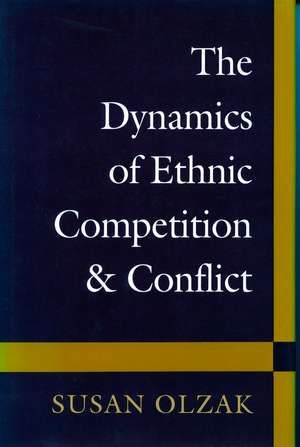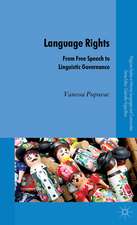The Dynamics of Ethnic Competition and Conflict
Autor Susan Olzaken Limba Engleză Paperback – 31 aug 1994
This analysis of the causes of racial and ethnic conflict in American cities between 1877-1914 presents evidence that suggests that the explanation for ethnic unrest is to be found in competition processes.
| Toate formatele și edițiile | Preț | Express |
|---|---|---|
| Paperback (1) | 195.80 lei 3-5 săpt. | |
| Stanford University Press – 31 aug 1994 | 195.80 lei 3-5 săpt. | |
| Hardback (1) | 704.92 lei 6-8 săpt. | |
| Stanford University Press – 30 noi 1992 | 704.92 lei 6-8 săpt. |
Preț: 195.80 lei
Nou
Puncte Express: 294
Preț estimativ în valută:
37.46€ • 39.12$ • 30.94£
37.46€ • 39.12$ • 30.94£
Carte disponibilă
Livrare economică 25 martie-08 aprilie
Preluare comenzi: 021 569.72.76
Specificații
ISBN-13: 9780804723374
ISBN-10: 0804723370
Pagini: 288
Dimensiuni: 152 x 229 x 20 mm
Greutate: 0.39 kg
Ediția:1
Editura: Stanford University Press
Colecția Stanford University Press
ISBN-10: 0804723370
Pagini: 288
Dimensiuni: 152 x 229 x 20 mm
Greutate: 0.39 kg
Ediția:1
Editura: Stanford University Press
Colecția Stanford University Press
Recenzii
"Susan Olzak promises a great deal in this book and delivers even more. She makes strong hypothetical claims derived from rich theoretical arguments, develops elegant empirical tests of them, and quite cautiously fashions conclusions out of the pattern of results. The book provides a remarkably coherent model for studying ethnic conflict. . . . With this superb monograph Susan Olzak establishes a niche for herself among the best scholars of ethnic conflict and collective action."—American Journal of Sociology
Notă biografică
Susan Olzak is Professor of Sociology at Stanford University. She is the author of The Dynamics of Ethnic Competition and Conflict (Stanford University Press, 1992).
Textul de pe ultima copertă
“Susan Olzak promises a great deal in this book and delivers even more. She makes strong hypothetical claims derived from rich theoretical arguments, develops elegant empirical tests of them, and quite cautiously fashions conclusions out of the pattern of results. The book provides a remarkably coherent model for studying ethnic conflict. . . . With this superb monograph Susan Olzak establishes a niche for herself among the best scholars of ethnic conflict and collective action.”—American Journal of Sociology













